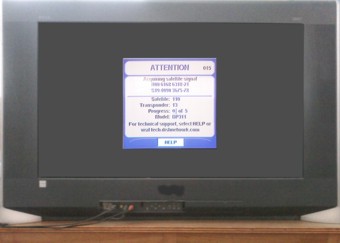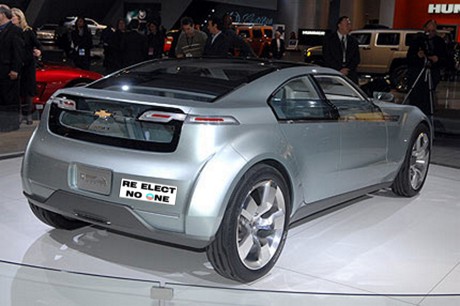


 Obama Motors has halted production of their campaign centerpiece vehicle, the Chevrolet Volt. 1,500 more workers at the newly refurbished Detroit-Hamtramck assembly plant will be unemployed. Turns out buyers don’t want one
Obama Motors has halted production of their campaign centerpiece vehicle, the Chevrolet Volt. 1,500 more workers at the newly refurbished Detroit-Hamtramck assembly plant will be unemployed. Turns out buyers don’t want one
Taking a page from China’s marketing strategy (drop the price until people buy things they don’t want), the Administration will raise the tax rebate from $7,500 to $10,000. We expect about 4,300 Volt dealers to be repurposed as Dollar Stores by November.
No plastic garbage bag will open from the end you first try.
— Internet wisdom
Good to know.
I’ve never had that problem since I use plastic grocery bags in all the garbage cans.
Back in the dark ages, a grocery store bag boy carefully placed all your perishables in one proud paper bag and your canned goods in a double bag and your sundries in a third paper bag. The bags themselves were designed with folds to make them stack easily and flat bottoms to make them simple to fill. My mom could usually get a couple more uses out of a bag — carting books to the library or supplies down to the boat — before using it to line the trash can. And a paper bag full of trash could be burned easily or composted or left to rot away in days at the dump.
When the grocery chains stopped asking “paper or plastic,” I had to substitute a plastic bag for the paper bag in the trash can.
Now the Far Green wants us to stop using plastic grocery bags because they clog the landfills. Grocers are happy to go along because the grocery bags cost them money and because we now have to buy something to handle our trash.
Common sales wisdom is that the most effective marketing campaign ever was the addition of a single word to a label. The story isn’t true (a marketing executive becomes an industry legend by adding the word REPEAT to shampoo bottles in writer John Cheever’s son Benjamin’s novel The Plagiarist — shampoo sales doubled overnight) but that’s marketing.
I reckon the most effective marketing campaign ever was crafted when Canadians Harry Wasylyk, Larry Hansen, and Frank Plomp invented a product whose only purpose is to be thrown away.
Let’s examine that in light of our new, Far Green, sensibility.
“A bin bag, swag sack or bin liner or garbage bag or trash bag is a disposable bag used to contain rubbish or trash,” says Wikipedia. The only reason you buy a garbage bag is to throw it away.
Sheesh.
“Most commonly, the plastic used to make bin bags is the rather soft and flexible LDPE (Low Density Polyethylene) or, for strength, LLDPE (Linear Low Density Polyethylene) or HDPE (High Density Polyethylene) are sometimes used.
“Some bags are made of biodegradable polythene film. These will decompose when exposed to air, sun, and moisture or submitted for composting. They do not readily decompose in a sealed landfill. They are also considered a possible contaminant to plastic recycling operations.”
That’s good news. Not.
“Kind of makes you wonder what else the environmentalists got wrong,” Rufus muttered.
Anne and I both reuse grocery bags to cart books to and from the library. I’ve reused them to protect my cellphone in the rain and to carry a dripping towel from the beach. Rufus stores spent coffee grounds (which he figured is redundant) to use later as mulch. And we have never, ever had trouble opening a grocery bag to refill it with either stuff or trash.
For the record, no plastic produce bag will open from the end you first try, either, despite the HUGE green arrow printed onnit.
“Wet your fingertips first,” Rufus said. “It works much better.”
That’s exactly correct, as long as you actually try the end with the HUGE green arrow.